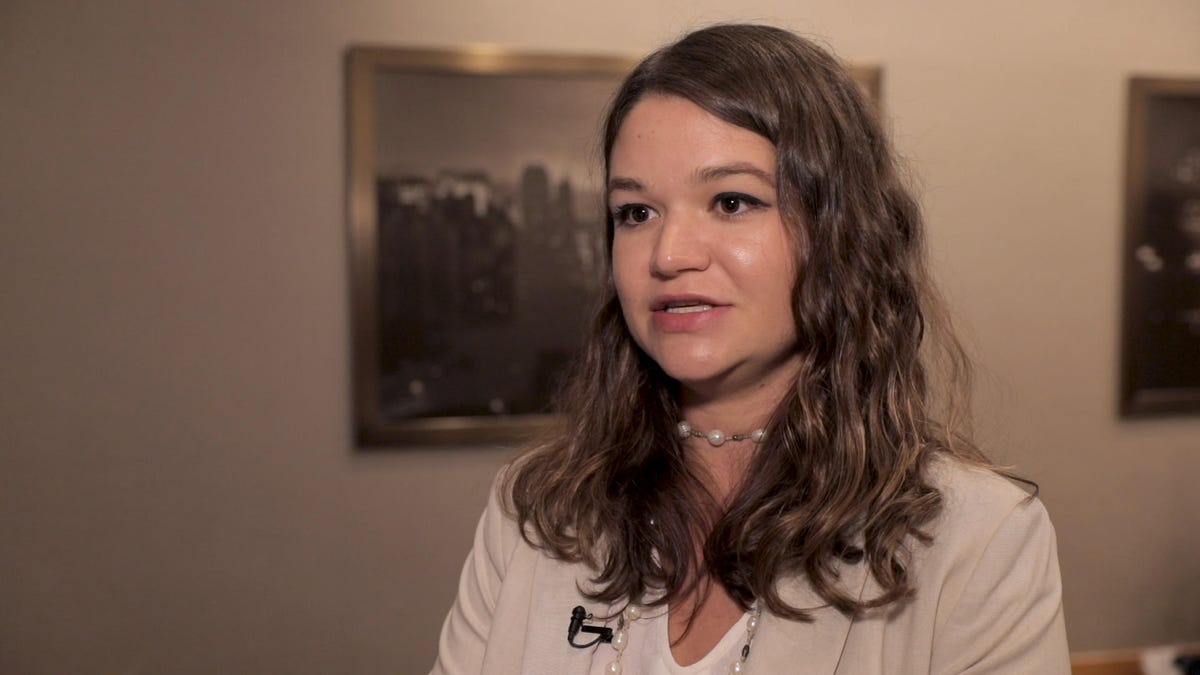Cambridge Analytica ex-director: Don't delete Facebook, reform it
An ex-exec at Cambridge Analytica, which is at the center of Facebook's data scandal, has a vision for the future of your privacy.

Brittany Kaiser, a former director at Cambridge Analytica, calls for Facebook and Google to reform data policies.
Sitting in front of a backdrop with "R.I.P. stolen data" plastered on it, a former director of Cambridge Analytica had a message for Mark Zuckerberg: It's time to change.
Brittany Kaiser, who came to New York City a day after testifying to the UK Parliament about Facebook's data scandal with Cambridge Analytica, a data profiling firm, has changed her tone on the industry she used to help run.
Cambridge Analytica has served as a focal point for data concerns after a whistleblower revealed that the company acquired data on up to 87 million Facebook users without their OK through a quiz created by University of Cambridge researcher Aleksandr Kogan and his company, Global Science Research. The incident has served as a catalyst for questions about Facebook's ability to protect our information.
During Tuesday's hearing in the UK, Kaiser said there were many more quizzes Cambridge Analytica took data from for political purposes, including one called "sex compass."
On Wednesday, Kaiser, who'd been the director of program development at Cambridge Analytica for four years until January, positioned herself as an advocate for data privacy. She called out companies like Facebook, Google and Amazon for making billions of dollars off people's data, but said she thinks they can run tighter ships.
"I'm not a supporter of the #DeleteFacebook campaign," Kaiser said. "I think that Google, Facebook and Amazon can reform."
See also
She also said her new project, IOVO, or the Internet of Value Omniledger, can help. The idea is for tech companies like Facebook and Google to view data as people's property, and to let people sell that data for money, instead of trading it to use services for free.
Kaiser compares the idea to Airbnb, where people can open up their homes to the app in exchange for money. She doesn't want people to delete their Facebook accounts; she wants them to make money from Facebook.
She pointed out that under the current agreements between tech companies and their billions of users, people are giving up valuable information for free without even being aware of it.
"There's a very low amount of data literacy around people," Kaiser said during the press conference.
Facebook has vowed to protect people's privacy better, with Zuckerberg telling US lawmakers that users own their data. The social network also changed its data policy and how app developers can harvest information on people.
But the data on 87 million people harvested from Cambridge Analytica was just the tip of the iceberg, Kaiser told CNET in an interview. She mentioned there were thousands of companies likely doing the same sort of data scraping Cambridge Analytica did, and different quizzes that filled up the social network.
"For Facebook to only admit that 87 million individuals would have had their profiles compromised, I think is really underestimating the situation," Kaiser said.
The new project had its fair share of skeptics, considering Kaiser's history with Cambridge Analytica, and how the company took advantage of that very data illiteracy Kaiser spoke of. At the press conference, Wired journalist Issie Lapowsky asked why Kaiser should be the messenger for new data-privacy standards.
Kaiser said her history with Cambridge Analytica was an advantage, pointing out that she'd been working with data-profiling for politics for over a decade.
"To be honest, for many years, I never questioned it," Kaiser said. "That's the way that the political system works. That's the way that advertising works. That's the way that every single industry that exists in the entire basis of digital communications works. I do really understand the industry, and I have the ability to be a voice for change."
First published, 9:53 a.m. PT
Update, 1:18 p.m.: Includes comments from an interview with Kaiser.
Cambridge Analytica: Everything you need to know about Facebook's data mining scandal.
iHate: CNET looks at how intolerance is taking over the internet.

